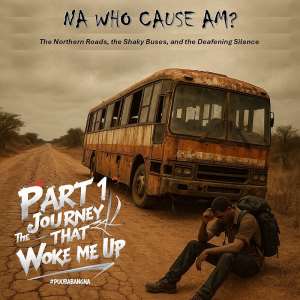
It was supposed to be just another trip home—routine, predictable, maybe even forgettable. I had made this journey from Tamale to Eggu, my hometown tucked somewhere in the Upper West Region of Ghana, more times than could count. I knew the route: the twists, the turns, the familiar dips that caught you off guard even when you thought you were ready. I knew the faces—the women hawking drinks, the herdsmen nudging cattle off the road, the weary passengers like me just trying to get home. I knew the sounds—the chatter in Dagaare, the gospel songs crackling through an old bus speaker, the dull groan of tyres dragging themselves through dust.
I thought I knew what to expect.
But this time, something was different.
Not the road—it had long given up on pretending to be a highway. What changed was something inside me.
It all began with the usual battered Intercity STC bus coughing its way out of the Tamale terminal. The seats sighed under our weight. The windows clattered like empty pots in a storm. A tired air-condition fan spun slowly above our heads, stirring warm air and false hope. I had braced myself for discomfort—but this time, it felt like an insult. I anticipated the rough ride—but this time, it felt like a punishment.
Then came the moment.
A loud, jarring bang!
As if the earth itself had lost patience with our silence.
The tyres plunged into a pothole so deep and wide it could cradle a coffin. The impact shot up my spine, harsh and unforgiving, rattling my bones and shaking my thoughts. My head snapped—first to the window, then to the aisle, and then to the driver, whose eyes flicked to the rearview mirror as though checking if we were still alive.
And that’s when I saw it.
The faces.
The pain.
The resignation.
A mother clutching a baby whose cries rose above the engine’s groans.
A young man, earphones in, head pressed to the cracked glass—lost in music, or perhaps in escape.
An old woman muttering quiet prayers, not for miracles but for mercy.
And me—still, silent, but boiling inside.
This wasn’t just a road we were on—it was a symbol of everything that had gone wrong.
The road was not just bad.
It was a betrayal.
And the bus? It wasn’t just uncomfortable.
It was a metaphor on wheels.
A slow, rusting, exhausted metaphor for how we, the citizens, have been taught to expect less. To accept the unacceptable. To endure what should never be endured.
Once a proud emblem of national mobility and progress, our Intercity STC buses have become roving museums of neglect. Groaning, wheezing, breaking down under the weight of public silence and political abandonment.
But listen—this is not just my story.
This is Ghana’s story.
What I experienced on that road is what millions endure every day. From Hohoe to Bawku. From Tarkwa to Tumu. From Afram Plains to Krachi. Ghanaians are not merely traveling—we are struggling. Battling potholes that look like craters. Crossing bridges that feel like gambles. Riding in buses that should have been retired a decade ago, but are still being forced to carry dreams, families, futures.
And still—we keep quiet.
Why?
Is it fatigue?
Or fear?
Or have we just normalized the rot so deeply that we no longer recognize it as rot?
But that day, I couldn’t stay quiet anymore.
Something snapped. Something awakened.
And so, I asked:
Na who cause am?
Who let it get this bad?
Who promised to fix it, only to forget us once the votes were counted?
Who looked away while the roads cracked, and our patience wore thin?
And more urgently—how do we fix this?
Because that journey didn’t just take me to Eggu.
It took me straight into the heart of Ghana’s dilemma.
It showed me how far we’ve fallen—and how silent we’ve become in our suffering.
And it woke me up.
That single journey shattered my comfort, cracked open my silence, and forced me to confront the deeper question:
Is this really the Ghana we dreamed of?
But that was only the beginning.
Because what I saw after I got home—in Eggu—would challenge me even more.
The roads had spoken, yes.
But the village had a louder message.
One I wasn’t ready for.
Part Two: “A Tale of Two Crises: The Road and the Ride”
(Coming up next)
(The Northern Roads, the Shaky Buses, and the Deafening Silence)
By Victor Raul Puobabangna from Eggu, in the Upper West Region of Ghana


